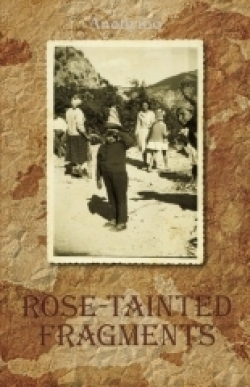Rose-Tainted Fragments
A year in the life of a prepubescent Italian boy will typically elicit yawns, unless that child will someday be famous. The mundane events of daily existence in a group of small downtrodden villages are not earth-shattering, unless that life is filled with traumatic episodes bad enough to hit the news. Generally speaking, unless there’s a “big deal” somewhere, no one wants to hear about it—unless the story is told by an anonymous author who has a way with words.
Rose-Tainted Fragments is an eccentric novel about growing up. Opening in the summer months, the book is divided into seasonal sections and filled with rich descriptions of ethnic locales and family conventions. This author misses not a single detail if the sound, sight, or smell of a setting has impacted his unnamed boy. The protagonist is acutely aware of every touch and every taste. The story is told from his viewpoint, and the reader feels whatever this young man feels at any given moment. He is on the brink of puberty, losing his innocence and infantile emotional outlook.
Laced throughout this tale is a wealth of subtle religious and social commentary, often with a political edge. The author has allowed the perceptive reader a glimpse of rooted tradition, an old culture with flaws that grasp the boy with wounding tentacles. Executed with literary skill, the novel reflects probing intelligence as well as sophisticated tact.
This book’s single weakness is in the anonymous presentation, an unorthodox approach that lowers its perceived quality. Though semi-autobiographical works often remain discreet, covered with fictional veils and enhanced with dramatizations, the accepted publishing industry standard is a pseudonym, not anonymity.
The author has dedicated this work to his ancestors, stating that the story is based on real events. Though all fiction may be drawn from a writer’s experiences, his novel is steeped in heady realism and created with a clarity of vision that reflects empathy, not mere sympathy. The narrator understands every motivation, comprehends every response, and the pages are filled with genuine emotion. Imagination alone cannot conjure up the lifelike imagery and tangible sensation within this book.
Written in the nineteenth-century bildungsroman tradition, this exceptional novel will appeal to literature connoisseurs and Italian culture enthusiasts seeking the painstaking descriptions that only an articulate writer can provide. This insightful story focuses on the angst of a boy at a turning point, resisting change in one breath, yet welcoming the prospect of rebirth in the next.
Reviewed by
Julia Ann Charpentier
Disclosure: This article is not an endorsement, but a review. The publisher of this book provided free copies of the book and paid a small fee to have their book reviewed by a professional reviewer. Foreword Reviews and Clarion Reviews make no guarantee that the publisher will receive a positive review. Foreword Magazine, Inc. is disclosing this in accordance with the Federal Trade Commission’s 16 CFR, Part 255.

